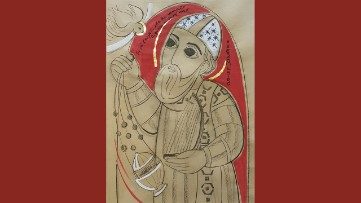St. Ephrem, Deacon and Doctor of the Church

Deacon and poet
When the bishop of Nisibis, in modern-day Turkey, returned from the Council of Nicea in 325 – the Church’s first great attempt to articulate the faith it had lived and confessed under three centuries of persecution – a young deacon in his city, recently baptized, caught his attention. Ephrem (b. 306), probably the son of believing parents, had in him all the faith of this small but flourishing Christian community. He lived a Syriac prototype of monasticism, in which loosely associated Christians in cities and villages committed themselves to the Lord’s celibacy and made themselves available for the care of the community.
This young man also had a gift: he had studied the Scriptures while preparing for baptism and was filled with the images they contain. In telling other people about them, he captivated their imagination. Ephrem had a gift for words – not just many words, but beautiful words, words that contained the life of God and the praise of human hearts. He was a poet filled with zeal for the Lord. Bishop Jacob appointed the young man the teacher, or exegete of Nisibis.
An ocean of symbols
Ephrem did teach with great vigor. After Nisibis was surrendered to the Persian army and the Christians were expelled in 363, he taught in Edessa. While political tumult raged around him, the divinity of Christ, the mystery of the Incarnation, Paradise and the Fall, the virginity of Mary, were clothed in images as he spoke. It was not unlike how the Lord, out of love for mankind, clothed himself in flesh.
Ephrem saw symbols, that is, connections, or things that open up to reveal deeper and greater things – ultimately, the Lord Jesus Christ – everywhere. He saw these symbols in the Scriptures, but also in the whole creation: “In every place you look, His symbol is there… For by Him were created all creatures and He imprinted His symbols upon His possessions when He created the world.” Elsewhere Ephrem exclaims, “This Jesus created so many symbols that I have fallen into them as into the sea!”
The harp of the Holy Spirit
When Ephrem spoke or wrote, those symbols became poems, hymns set to music through which people began to sense the fragrance of God hidden everywhere. “The harp of the Holy Spirit,” they called him. They understood that through this man, God was “playing” his own music and building up his people in the faith.
An ancient writer relates how a holy elder once dreamt of Ephrem. “When the father arose in the morning,” the story goes, “he heard people saying, ‘Ephrem teaches as if a fountain were flowing from his mouth.’ Then the elder who had seen the dream recognized that what issued from his lips was from the Holy Spirit.”
Praise of the Merciful One
This spiritual stream flowing from Ephrem’s mouth was a prayer blessing the merciful God who bent down over suffering humanity. Through disobedience, Adam lost the “robe of glory” that had clothed him in Paradise. But blessed, Ephrem exclaims, “is He who descended, put Adam on” like a robe “and ascended.” Contemplating the Lord’s Nativity, he writes: “Blessed be the Newborn who… made humanity young again…. Blessed be the fruit Who bowed Himself down for our hunger. Blessed be the Gracious One who … enriched all of our poverty and filled our need.”
The Compassionate One whom he extolled gave Ephrem more than the gift of words. The holy deacon also received a share in the divine compassion his words celebrated. During a famine, Ephrem organized provisions and beds for the starving. Finally, when plague struck the city, he tended to the sick until he himself succumbed to the disease. In his lifetime, he had given many a glimpse of Paradise as he taught them to praise. “Who has ever beheld gatherings of people, whose sustenance is the giving of praise?”, he once wrote of heaven. On June 9, 373, this Syriac Doctor of the Church, the greatest hymnographer of the Christian East, took his place in the gathering his words had described.







